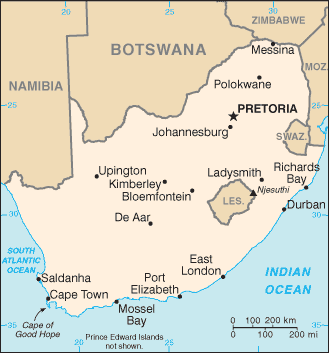Paco travels to South Africa: Paco meets new people
In this topic, we will study, on the one hand, two of the most frequently used tenses in English, the Present Simple and the Present Continuous as well as verbs which cannot be used in the Present Continuous (stative verbs). We will also remember how important it is to master the word order in English which, by the way, is, as you know, more fixed than in other languages such as Spanish.
On the other hand, we will have a look at how to describe people's personality, so we will need to learn some vocabulary on the subject. Finally, we will see diphthongs and triphthongs in English, as it is very important that you improve your pronunciation, too. Come on, let's begin the topic!

|
| By kspoddar. C. Commons |
Paco has just arrived in Johannesburg. At the moment, he is having a drink in the bar of the hotel. In a couple of weeks he is going to Cape Town. Although he is thirsty and really tired, he wants to meet some new people before going to bed so that he can get further information about the country. He needs to plan his stay in Africa. He has an idea of the places he is going to visit, but he'd rather be sure he doesn't miss any interesting place in this continent. He isn't in a hurry, but he thinks that the sooner he knows where to go after Cape Town, the better. He feels like visiting different places in Africa and he is ready to get all the information he needs tonight.
Sitting at a table, Paco is enjoying a fantastic huge soft drink which is making him feel far better. He doesn't like alcohol, so he always has soft drinks. As you now know, he doesn't like flying. He gets really anxious on planes. He hopes the book the man on the plane recommended him helps him get over this fear. However, now he is relaxed and relieved. He won't have to fly in several weeks!
He is so thirsty that he is drinking very quickly. In fact, the glass is not empty yet and he has just ordered another drink. While the waiter is placing it on the table, Paco asks him:
Paco: Good evening, my name's Paco and I'm from Spain. I've just arrived from the United States and I'm spending several weeks in your country. Could you tell me anything about it?
Waiter: Good evening, sir. Well, The Republic of South Africa, also known by other official names, is a country located at the southern tip of the continent of Africa. The South African coast stretches 2,798 kilometres (1,739 mi) and borders both the Atlantic and Indian oceans. To the north of South Africa lie Namibia, Botswana and Zimbabwe, to the east are Mozambique and Swaziland, while the Kingdom of Lesotho is an independent enclave surrounded by South African territory.
 |
| By Anonymous. Public Domain |
(Paco gets dumbfounded, as the waiter repeated all that information by heart!)
Paco: Than... Thank you very much!
Waiter: You're welcome, sir.
1 From Wikipedia.org
Answer the following questions.

|
|
By ♥•* Yanieck*♥•' (hardly no time for the ne. C. Commons
|
1. Does Paco want to get extra information about South Africa soon?
|
a. Yes, he does.
| |
|
b. No he doesn't.
|
|
a. No, he isn't.
| |
|
b. Yes, he is.
|
|
a. Yes, it is.
| |
|
b. No, it isn't.
|
|
a. Yes, there are.
| |
|
b. No, there aren't.
|

|

|
|
|
The term Black is used to refer to people of a racial group with a light brown to a black skin-colour. It is correctly used and is not considered offensive. On the other hand, the term nigger, from Spanish or Portuguese negro (Lat. niger), is a pejorative term to refer to people from that race, especially from the 1960s on, although before that year, most polite people and writers avoided using this term. This is what Scarlett said about a slave:
'You're a fool nigger, and the worst day's work Pa ever did was to buy you,' said Scarlett slowly. ... There, she thought, I've said 'nigger' and Mother wouldn't like that at all. [Margaret Mitchell, Gone With the Wind, 1936]
The term Negro is also used in English to refer to people of a black-skinned race, but it is also offensive on some occasions. Taking that into account, you should try to be polite when referring to people of a different race from yours and use the terms appropriately, use Black people.
Remember that you may use our friend to improve your pronunciation. Ask him how to pronounce words, phrases or, even, whole sentences. Come back whenever you need him!